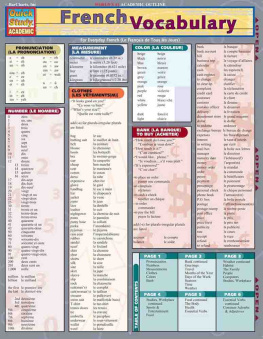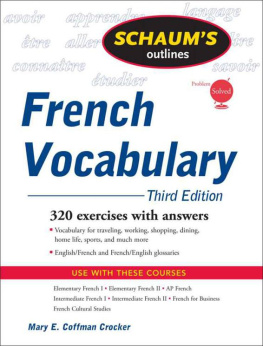Mary E. Coffman Crocker - French vocabulary
Here you can read online Mary E. Coffman Crocker - French vocabulary full text of the book (entire story) in english for free. Download pdf and epub, get meaning, cover and reviews about this ebook. year: 2020, publisher: MCGRAW-HILL EDUCATION, genre: Detective and thriller. Description of the work, (preface) as well as reviews are available. Best literature library LitArk.com created for fans of good reading and offers a wide selection of genres:
Romance novel
Science fiction
Adventure
Detective
Science
History
Home and family
Prose
Art
Politics
Computer
Non-fiction
Religion
Business
Children
Humor
Choose a favorite category and find really read worthwhile books. Enjoy immersion in the world of imagination, feel the emotions of the characters or learn something new for yourself, make an fascinating discovery.

- Book:French vocabulary
- Author:
- Publisher:MCGRAW-HILL EDUCATION
- Genre:
- Year:2020
- Rating:5 / 5
- Favourites:Add to favourites
- Your mark:
- 100
- 1
- 2
- 3
- 4
- 5
French vocabulary: summary, description and annotation
We offer to read an annotation, description, summary or preface (depends on what the author of the book "French vocabulary" wrote himself). If you haven't found the necessary information about the book — write in the comments, we will try to find it.
French vocabulary — read online for free the complete book (whole text) full work
Below is the text of the book, divided by pages. System saving the place of the last page read, allows you to conveniently read the book "French vocabulary" online for free, without having to search again every time where you left off. Put a bookmark, and you can go to the page where you finished reading at any time.
Font size:
Interval:
Bookmark:
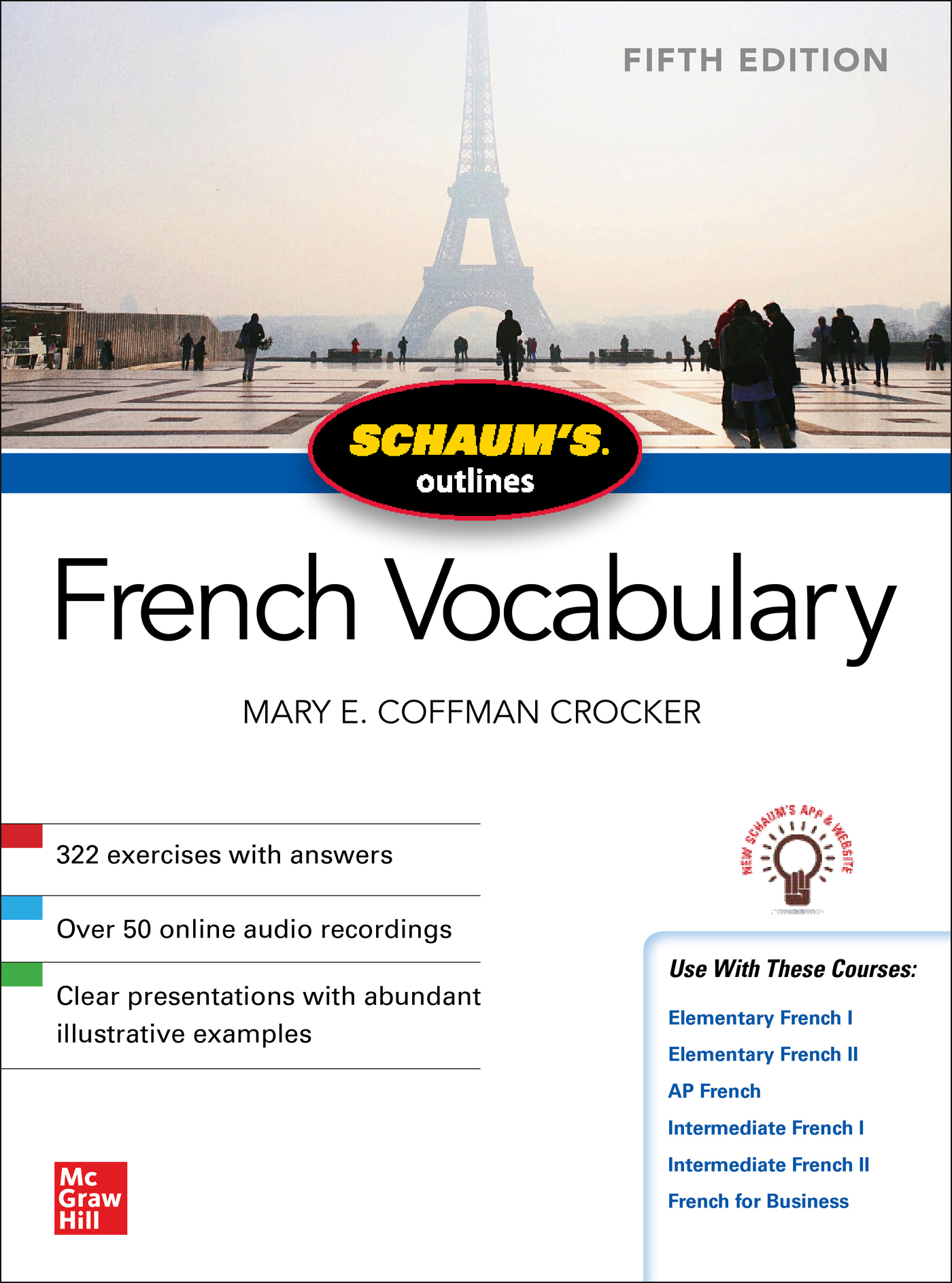
 Copyright 2021, 2014, 2009, 1998, and 1985 by McGraw Hill. All rights reserved. Except as permitted under the United States Copyright Act of 1976, no part of this publication may be reproduced or distributed in any form or by any means, or stored in a database or retrieval system, without the prior written permission of the publisher. ISBN: 978-1-26-046283-8
Copyright 2021, 2014, 2009, 1998, and 1985 by McGraw Hill. All rights reserved. Except as permitted under the United States Copyright Act of 1976, no part of this publication may be reproduced or distributed in any form or by any means, or stored in a database or retrieval system, without the prior written permission of the publisher. ISBN: 978-1-26-046283-8MHID: 1-26-046283-8 The material in this eBook also appears in the print version of this title: ISBN: 978-1-26-046282-1, MHID: 1-26-046282-X. eBook conversion by codeMantra
Version 1.0 All trademarks are trademarks of their respective owners. Rather than put a trademark symbol after every occurrence of a trademarked name, we use names in an editorial fashion only, and to the benefit of the trademark owner, with no intention of infringement of the trademark.
Where such designations appear in this book, they have been printed with initial caps. McGraw-Hill Education eBooks are available at special quantity discounts to use as premiums and sales promotions or for use in corporate training programs. To contact a representative, please visit the Contact Us page at www.mhprofessional.com. MARY E. COFFMAN CROCKER is a French editor, author and consultant in Toronto, Ontario. She was previously Senior Editor, French as a Second Language, Copp Clark Pitman, Toronto, Ontario; Directrice des ditions, Langues Secondes, Centre ducatif et Culturel, Montral, Qubec; and Sponsoring Editor, Foreign Language Department, McGraw-Hill Book Company, New York, New York.
She is also the author of Schaums Outline of French Grammar, Sixth Edition and a biographee in Whos Who of American Women, Ninth Edition. TERMS OF USE This is a copyrighted work and McGraw-Hill Education and its licensors reserve all rights in and to the work. Use of this work is subject to these terms. Except as permitted under the Copyright Act of 1976 and the right to store and retrieve one copy of the work, you may not decompile, disassemble, reverse engineer, reproduce, modify, create derivative works based upon, transmit, distribute, disseminate, sell, publish or sublicense the work or any part of it without McGraw-Hill Educations prior consent. You may use the work for your own noncommercial and personal use; any other use of the work is strictly prohibited. Your right to use the work may be terminated if you fail to comply with these terms.
THE WORK IS PROVIDED AS IS. McGRAW-HILL EDUCATION AND ITS LICENSORS MAKE NO GUARANTEES OR WARRANTIES AS TO THE ACCURACY, ADEQUACY OR COMPLETENESS OF OR RESULTS TO BE OBTAINED FROM USING THE WORK, INCLUDING ANY INFORMATION THAT CAN BE ACCESSED THROUGH THE WORK VIA HYPERLINK OR OTHERWISE, AND EXPRESSLY DISCLAIM ANY WARRANTY, EXPRESS OR IMPLIED, INCLUDING BUT NOT LIMITED TO IMPLIED WARRANTIES OF MERCHANTABILITY OR FITNESS FOR A PARTICULAR PURPOSE. McGraw-Hill Education and its licensors do not warrant or guarantee that the functions contained in the work will meet your requirements or that its operation will be uninterrupted or error free. Neither McGraw-Hill Education nor its licensors shall be liable to you or anyone else for any inaccuracy, error or omission, regardless of cause, in the work or for any damages resulting therefrom. McGraw-Hill Education has no responsibility for the content of any information accessed through the work. Under no circumstances shall McGraw-Hill Education and/or its licensors be liable for any indirect, incidental, special, punitive, consequential or similar damages that result from the use of or inability to use the work, even if any of them has been advised of the possibility of such damages.
This limitation of liability shall apply to any claim or cause whatsoever whether such claim or cause arises in contract, tort or otherwise.
The content of each chapter is focused on a real life situation such as making a telephone call, travelling by plane or train, staying at a hotel, or shopping for food. The book has been updated to include changes for many of the topics. New to Unit 4 is a section on social media and electronic devices such as smartphones and tablets. Each chapter is divided into subtopics. Key words are presented in illustrations and in text presentations. Words that are specifically French Canadian are flagged as such.
Extensive footnotes inform the reader of other ways of saying the same thing and further clarify the use of words. To enable readers to build and retain the new vocubulary, the book provides many opportunities to use the new words. After the presentations of new words, the student is immediately directed to practice these words in a multitude of exercises. Personalized questions, open-ended questions, and role-playing suggestions provide for more communicative practice. Answers are provided at the back of the book so students can make prompt self-correction. Appendixes include numbers, dates, and times; a special list of all foods; equivalent European and North American clothing and shoe sizes; family relationships; francophone countries; weights and measures; and personal correspondence.
At the end of the book, a French-English and English-French glossary contain most of the key words introduced in the book. See the ad on the inside of the front cover for directions on downloading a companion audio recording of some of the answer keys (). A picture of headphones appears by the exercises that have answers recorded. You can use these recordings to practice your French comprehension and pronunciations skills For grammar reference and practice, the student can consult Schaums Outline of French Grammar. M ARY E. C OFFMAN C ROCKER
Following are some of the new rules. The circumflex (^) is no longer obligatory on the letters i and u except in instances where a word without the accent can be confused for another word. 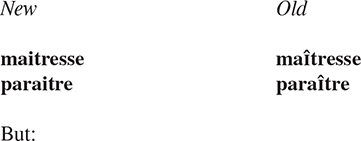 il crot (it grows), not to be confused with il croit (he believes) mr (ripe), not to be confused with mur (wall) All compound numbers can now be hypenated.
il crot (it grows), not to be confused with il croit (he believes) mr (ripe), not to be confused with mur (wall) All compound numbers can now be hypenated.  With verbs that have the letter in the next to the last syllable of the infinitive, the becomes in the future and conditional tenses.
With verbs that have the letter in the next to the last syllable of the infinitive, the becomes in the future and conditional tenses. 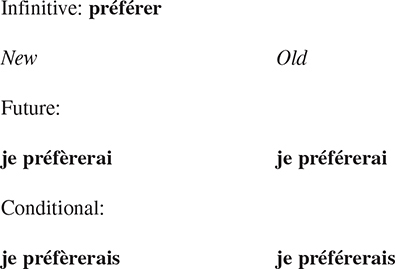
Font size:
Interval:
Bookmark:
Similar books «French vocabulary»
Look at similar books to French vocabulary. We have selected literature similar in name and meaning in the hope of providing readers with more options to find new, interesting, not yet read works.
Discussion, reviews of the book French vocabulary and just readers' own opinions. Leave your comments, write what you think about the work, its meaning or the main characters. Specify what exactly you liked and what you didn't like, and why you think so.

